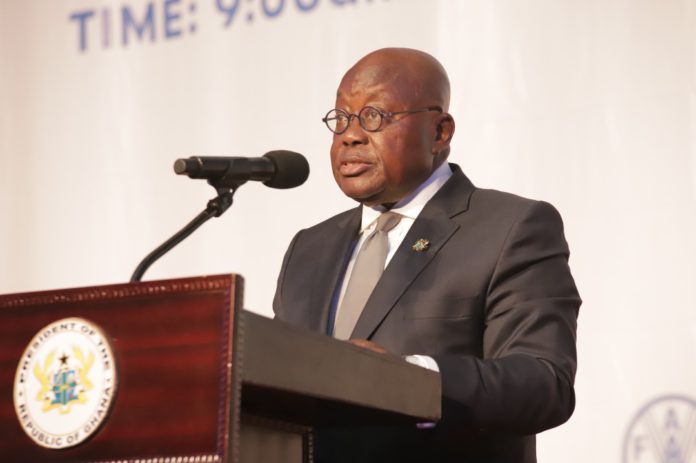President Nana Addo Dankwa Akufo-Addo has called on wealthy economies to re-channel a portion of their Special Drawing Rights (SDRs) sitting with the International Monetary Fund (IMF) to Africa to help fight hunger and food insecurity.
It would also augment health provision in the face of the challenges caused by the COVID-19 pandemic and the Russia-Ukraine crisis, he said.
This was contained in the ‘Accra Declaration’ issued by the President, in consultation with African Finance Ministers, at the end of the African Development Bank (AfDB) Annual General Meetings in Accra last Friday.
The declaration was handed over to the President of the AfDB, Dr Akinwuni Adesina, by the Vice-President, Dr Mahamadu Bawumia, on behalf of President Akufo-Addo.
The SDRs are an international reserve asset created by the IMF to supplement the official reserves of its member countries.
President Akufo-Addo said the SDRs could be disbursed to the continent through the AfDB for investment in projects critical to the recovery of the citizens and the economies from the pandemic.
On August 2, 2021, the Board of Governors of the IMF approved a general allocation of SDRs equivalent to $650 billion (about SDR 456 billion) to boost global liquidity. It was the largest SDR allocation in the history of the IMF.
Africa’s five per cent share of the allocation amounted to $33 billion
President Akufo-Addo said re-channeling the funds would enable the AfDB to leverage the resources by three to four times and use them to support Africa’s growing challenges, which included poverty, food insecurity and climate change.
He said that would also help Africa deal with the enormous challenges posed by the persistence of the COVID-19 pandemic, the repercussions of the Russian war in Ukraine and the severe disruptions to the development trajectories on the continent.
“This is also expected to help finance and capitalise African public development banks,” he stated.
The President urged the AfDB to take note of the looming food crisis, rising energy prices, skyrocketing inflation eroding consumer buying power and the prevalence of insecurity on the continent.
“I welcome the leadership of the AfDB Group to explore options for the strategic use of the SDRs to support Africa and note that providing SDRs through multilateral development banks has several benefits,” he said.
He said the SDRs could be absorbed by the AfDB as equity, which would further expand lending capacity to African countries and be used to provide additional capital and financing for development banks in Africa.
“Providing the SDRs for multilateral development banks will also strengthen the global financial architecture and foster greater complementarity with the IMF,” he added.
In his closing remarks, Dr Adesina pointed out that the AfDB had been working with other multilateral development banks to rally support from the leaders of developing and developed nations for its proposal to channel SDRs through multilateral development banks.
He said the continent could accelerate its development and cope with other challenges, such as climate change, debt, insecurity and the effects of the Russia-Ukraine crisis on their economies if it better leveraged the SDRs.
“We should use the SDRs in more pragmatic ways to support countries,” he said.
Dr Adesina said providing the SDRs through multilateral development banks had several benefits.
“First, the multilateral development banks can leverage the SDRs. At the AfDB, we can leverage the SDRs by a factor of four times. Second, the SDRs can be absorbed by the bank as equity, which will expand our lending capacity to countries.
“Thirdly, the SDRs that are leveraged will be used to provide additional capital and financing for the development banks in Africa as part of the Financing in Common. The SDRs can also be provided as concessional loans for the African Development Fund,” he explained.
He said providing the SDRs for multilateral development banks would make them become game changers for the accelerated development of countries.
“We are a leveraging machine; that is what multilateral development banks are, and channelling the SDRs through multilateral development banks will foster complementality between development institutions and the IMF.
“The IMF will focus on macroeconomic and fiscal stabilisation, its area of comparative advantage, while the multilateral development banks will focus on sectoral programmes and policies.
“That is our bread and butter; then we will be able to ensure that the SDRs deliver impactful results on the ground,” he said.
In his closing remarks, the Minister of Finance, Ken Ofori-Atta, noted that initiatives such as re-channelling the SDRs through the AfDB would go a long way towards mobilising the requisite capital for the continent’s development.
Mr Ofori-Atta, who is the outgoing Chairman of the Board of Governors of the AfDB, said it would also help enhance the prospects of market access for economies on the continent.
“I am proud of the progress we have made this week. Overall, our discussions have re-affirmed that despite the many challenges ahead, our collective resolve can ensure that we nurture an enduring recovery that creates prosperity across our entire continent and helps us create the Africa we want,” he said.

